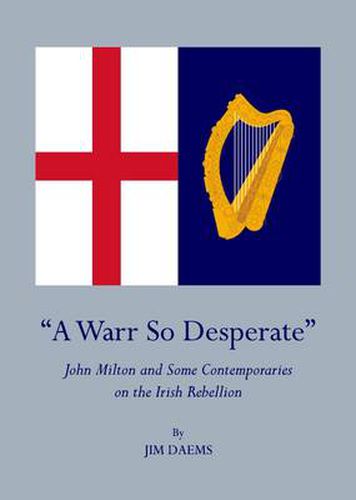Readings Newsletter
Become a Readings Member to make your shopping experience even easier.
Sign in or sign up for free!
You’re not far away from qualifying for FREE standard shipping within Australia
You’ve qualified for FREE standard shipping within Australia
The cart is loading…






A Warr So Desperate : John Milton and Some Contemporaries on the Irish Rebellion examines the political and colonial contexts of Milton’s Observations Upon the Articles of Peace, as well as the relatively brief, but significant comments on the Irish Rebellion that occur elsewhere in his work. Commissioned by the Council of State in March, 1649, Milton’s Observations puts forward the Commonwealth’s justifications for the reconquest of Ireland which would soon follow with Oliver Cromwell’s campaign. In doing so, Milton covers some familiar ground - for example, the trial and execution of Charles I, and the intolerance and political hypocrisy of the Presbyterians. However, the Irish Rebellion leads Milton to engage with these in a way which does not fit particularly well with how his views of personal, political, and religious liberties are generally perceived. Beginning with Milton’s pragmatic reading of the documents he cogently critiques in the tract, this book then situates Observations within the polemical contexts of the 1640s and early 1650s, particularly the frequent representation of Irish atrocities (reliant on both anti-Catholic and ethnic prejudices) and Eikon Basilike’s justification of Charles I’s handling of the rebellion, arguing both Milton’s agreement with and complicity in the reconquest.
$9.00 standard shipping within Australia
FREE standard shipping within Australia for orders over $100.00
Express & International shipping calculated at checkout
A Warr So Desperate : John Milton and Some Contemporaries on the Irish Rebellion examines the political and colonial contexts of Milton’s Observations Upon the Articles of Peace, as well as the relatively brief, but significant comments on the Irish Rebellion that occur elsewhere in his work. Commissioned by the Council of State in March, 1649, Milton’s Observations puts forward the Commonwealth’s justifications for the reconquest of Ireland which would soon follow with Oliver Cromwell’s campaign. In doing so, Milton covers some familiar ground - for example, the trial and execution of Charles I, and the intolerance and political hypocrisy of the Presbyterians. However, the Irish Rebellion leads Milton to engage with these in a way which does not fit particularly well with how his views of personal, political, and religious liberties are generally perceived. Beginning with Milton’s pragmatic reading of the documents he cogently critiques in the tract, this book then situates Observations within the polemical contexts of the 1640s and early 1650s, particularly the frequent representation of Irish atrocities (reliant on both anti-Catholic and ethnic prejudices) and Eikon Basilike’s justification of Charles I’s handling of the rebellion, arguing both Milton’s agreement with and complicity in the reconquest.